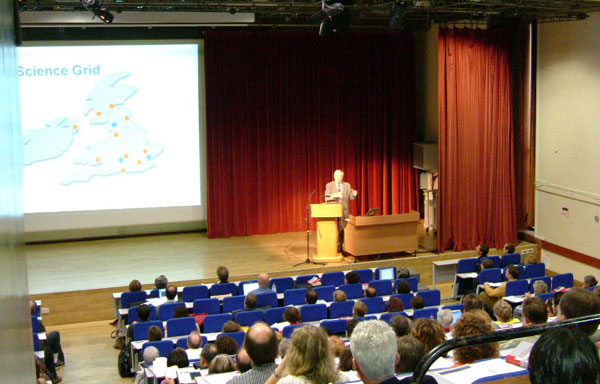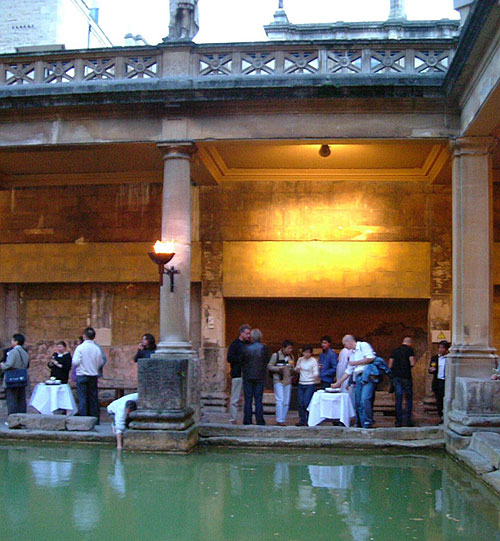ECDL 2004: A Digital Librarian's Report
This year it was the turn of the UK to host this major European conference and researchers and librarians took the opportunity to recharge and hear about and debate the latest research and technology advances in digital libraries. There were 47 peer-reviewed papers - a 32% acceptance rate. Remarkably papers were received from 27 countries.
There was something for everyone: from digital library architectures through innovative technologies and techniques and particular kinds of libraries - personal and music - and I was particularly pleased to attend several sessions more focussed towards the user.There was sometimes a dilemma choosing which parallel session to attend with a hearty sprint to the other lecture theatre. Inevitably with parallel sessions anyone's experience is biased in certain directions but having the book of the conference proceedings [1] on tap provided the opportunity to skim other papers, perhaps leaving the technical detail for later. Strangely the electronic proceedings were not yet listed on Springer's Web site at the time of going to press although later conferences are already available electronically. My university library now subscribes to the electronic version of the Lecture Notes in Computer Science Series but, tantalisingly, had the conference been available, my off-campus connection would still not have given me access.
Open access, either via the conference Web site or via the authors' institutional repositories seems such a logical way of rapidly disseminating digital library research results in a fast moving field. Interestingly I also missed having the book of abstracts which had room to scribble notes on which another beneficial conference, shortly before in Newcastle, (Digital Resources in Humanities [2]), had supplied. Its somehow inhibiting to write notes on a new book and the battery power of my computer is still not good enough to use it comfortably in a lecture theatre. The technology still has a way to go for me to be able to annotate effectively my personal conference library!

Tony Hey introducing e-Science to the digital libraries agenda
Conference Highlights
Three keynote talks were placed strategically at the beginning, middle and end to stimulate us to think broadly about digital libraries and their external links.
Professor Tony Hey, Director of the UK e-Science Core Programme, in a talk entitled e-Science and the Grid - e-Infrastructure and Digital Libraries, gave some wonderful examples of new research in e-Science enabled within transient virtual organisations. The grid and e-infrastructure were terms used to describe a set of core middleware services.
The newly created Digital Curation Centre [3] would play an important role in a data intensive world and would need to liaise directly with individual researchers, data archives and libraries. In some areas, notably biology, databases were replacing publications as the medium of communication. He ended with a call to digital librarians to engage with e-researchers and make the most of their skills where they matter. The presentation by Jane Hunter of the University of Queensland, showed the way with a talk on Next Generation Search Interfaces - Interactive Data Exploration and Hypothesis Formulation spanning e-Science and innovative digital library techniques.
Neil McLean, Director, IMS Australia, in his keynote, also looked at interdependencies between people, digital content and institutions. Taking a broad brush, he looked at The Ecology of Repository Services: A Cosmic View ! Emergent e-learning communities need access to repository services. He described e-learning as being in the cottage industry phase. An evolving e-learning framework would be part of the next phase. Interoperability was also inevitably the theme of 3 case studies. A new Web Services SOAP (a server-to-server protocol for object retrieval) interface, was described by Ann Apps for one of them: zetoc - the British Library's current awareness and document delivery system.
With Liz Lyon, Director of UKOLN, as General Chair for the conference, the third keynote was, fittingly, given by Lorcan Dempsey, now Vice-President Research and Chief Strategist at OCLC in the US but also an earlier director of UKOLN which is based at the University of Bath. His talk was entitled Libraries, digital libraries and digital library research. He pointed out the problem of the bewildering convergence of technological developments that librarians had to cope with. He emphasised the co-evolution of the research and learning behaviours that we had been learning about earlier. A history of consumption also means we are unprepared for contribution. An interesting short paper presented by MacKenzie Smith of MIT on the evolution of DSpace as Open Source repository software caused a lot of discussion about the transition to this new sharing world.
As always when you have been cocooned in lecture theatres most of the day it is good to explore your surroundings and talk to other delegates more informally. With such an international audience - coming from as far away as Russia, China, Australia and the US, there was opportunity to meet up with distant friends and build up potential new collaborations. The City of Bath is such a wonderfully elegant city to spend the evening in and the conference organisers did us proud. The Roman Baths were magical as it got darker. The burning torches helped you forget the early autumn chill in the air.

Reception at the Roman Baths
Although there were opportunities to look at posters in the coffee breaks it was beneficial to have a special poster session designated on the second day. I appreciated the chance to discuss our poster on our 'Institutional Repositories' experiences with colleagues in different countries and also with others who were less familiar with the concepts of the Open Archive Initiative. The session was followed by a welcome drinks reception in the City's Art Gallery leading on to a banquet in the splendid Guildhall. Some people followed this with the contrasting delights of an Irish Bar - a little too noisy to continue talking technical! However, here I learnt from the Colorado contingent that next year's American conference JCDL 2005 [4] would be in Denver and the theme would highlight the powerful role of digital libraries as cyberinfrastructure. The theme seemed a natural progression from some of the digital library links being encouraged at this conference but couched in American terminology of course - cyberinfrastructure instead of e-infrastructure.
Finale
It was fitting to end with the new awards for Best Paper and Best Young Researcher's Paper. The DELOS Best Paper Award went to Ray Larson and Patricia Frontiera of Berkeley for their paper on Spatial Ranking Methods for Geographical Information Retrieval (GIR) in Digital Libraries. Besides learning a new acronym or two I discovered that you could make some significant improvements in Geographical Information Retrieval. The DELOS Research Exchange Award was assigned to the best paper presented at ECDL by a researcher under the age of 35 for research which had mainly been carried out at a European research organisation. The Young Researcher honoured was Markus Franke from the University of Karlsruhe. Markus with co-author Andreas Geyer-Schulz had tackled Automated Indexing with Restricted Random Walks on Large Document Sets. Using relatively lightweight usage data would be welcomed to help relieve the burden of manual indexing.
For some delegates there had been tutorials on the Sunday before the conference and for others related workshops afterwards but there was plenty enough in the main conference to stimulate new ideas. Next year's conference will be in Vienna [5], a grand city, and we were given a taster of the next conference to tempt us to travel further afield. In the meantime, the ECDL 2004 Conference Web site [6] gives an opportunity to look in detail at some of the presentations that either move forward research in your own area of expertise or give a chance to learn about some of the broader influences such as e-science and e-learning which will have an impact upon digital libraries in the future. The panels and other talks covered such a wide range of issues from the Semantic Web to cross-cultural usability. Many thanks to all the people who worked behind the scenes to make this digital libraries conference a stimulating gathering for delegates from a wide range of backgrounds.
Acknowledgements
My thanks to Francesca Borri and Vittore Casarosa of ISTI-CNR for information on the DELOS-supported awards for Best Paper and Best Paper by a Young Researcher. DELOS is Europe's Digital Library Network of Excellence funded under the EU 6th Framework Programme (FP6).
The Editor would like to thank Philip Hunter for the conference pictures.
References
- Heery, Rachel and Lyon, Liz (eds.) (2004) Research and Advanced Technology for Digital Libraries: Proceedings of 8th European Conference, ECDL 2004, Bath, UK, September 12-17 2004. Berlin, Springer-Verlag (LNCS 3232). http://www.springerlink.com/
- Digital Resources for the Humanities (DRH2004) Newcastle upon Tyne, 5-8 September 2004 http://drh2004.ncl.ac.uk/
Editor's note: Ariadne also carries in this issue a report on DRH2004 : http://www.ariadne.ac.uk/issue41/drh2004-rpt/ - The Digital Curation Centre http://www.dcc.ac.uk/
- JCDL 2005 Cyberinfrastructure for Research and Education, Denver, Colorado 7-11 June 2005 http://www.jcdl2005.org/
- ECDL 2005 Vienna, 18-23 September 2005 http://www.ecdl2005.org/
- ECDL 2004 http://www.ecdl2004.org/
